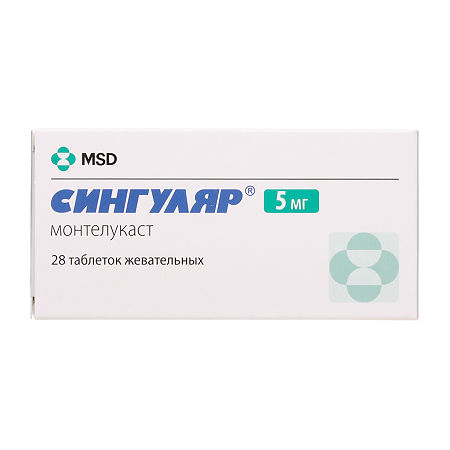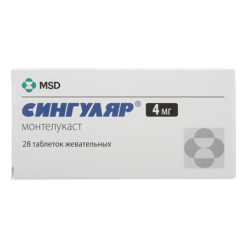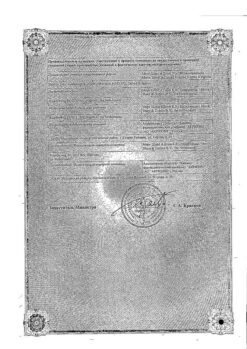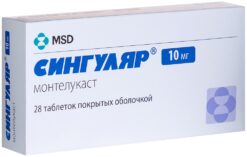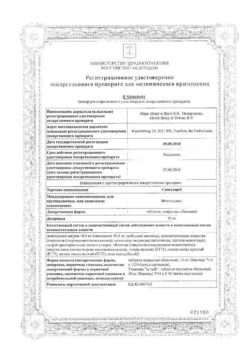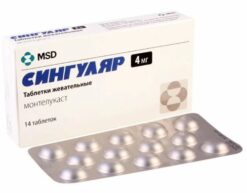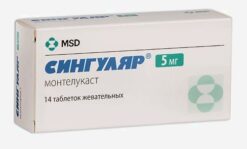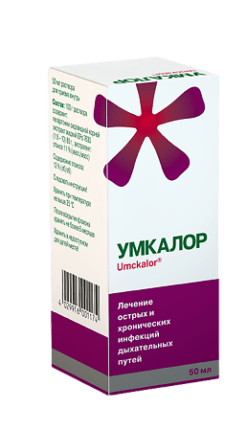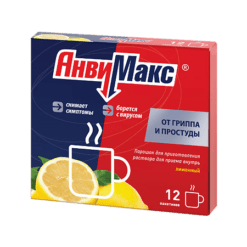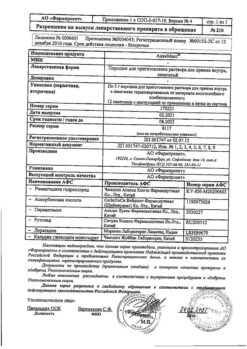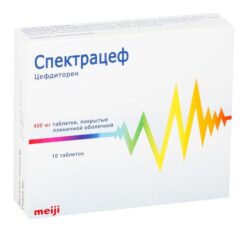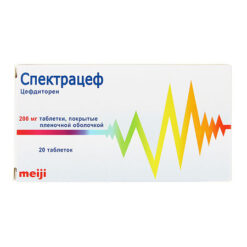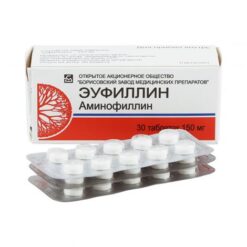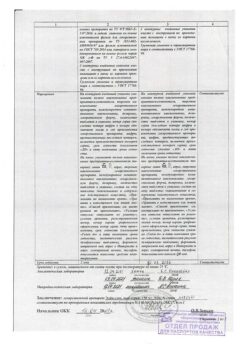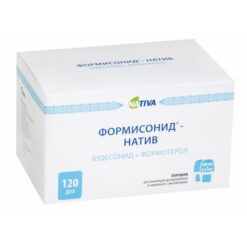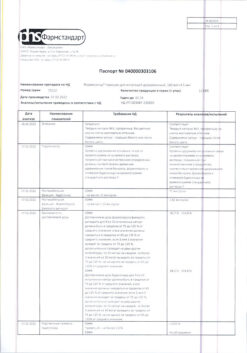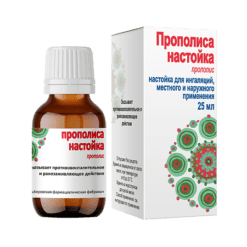No products in the cart.
Singular, 5 mg 28 pcs
€50.88 €42.40
Description
Bronchial asthma, Bronchospasm
- Prevention and long-term treatment of bronchial asthma in adults and children from 6 years old, including prevention of daytime and nighttime symptoms of the disease, treatment of aspirin-sensitive bronchial asthma patients and prevention of exercise-induced bronchospasm.
- Cutting daytime and nighttime symptoms of seasonal allergic rhinitis (in adults and children from 6 years) and persistent allergic rhinitis (in adults and children from 6 years)
.
Indications
Indications
Prevention and long-term treatment of bronchial asthma in adults and children from 6 years of age, including prevention of daytime and nighttime symptoms of the disease, treatment of aspirin-sensitive patients with bronchial asthma and prevention of exercise-induced bronchospasm.
Relief of daytime and nighttime symptoms of seasonal allergic rhinitis (in adults and children over 6 years of age) and persistent allergic rhinitis (in adults and children over 6 years of age)
Pharmacological effect
Pharmacological effect
Pharmacotherapeutic group:
Special instructions
Special instructions
The effectiveness of Singulair® for oral administration in the treatment of acute attacks of bronchial asthma has not been established, therefore Singulair® tablets are not recommended for the treatment of acute attacks of bronchial asthma. Patients should be instructed to always carry emergency medications to relieve asthma attacks (short-acting inhaled beta-2 agonists).
You should not stop taking Singulair® during an exacerbation of asthma and the need to use emergency medications to relieve attacks (short-acting inhaled beta-2 agonists).
Patients with a confirmed allergy to acetylsalicylic acid and other non-steroidal anti-inflammatory drugs (NSAIDs) should not take these drugs during treatment with Singulair®, since Singulair®, while improving respiratory function in patients with allergic bronchial asthma, however, cannot completely prevent bronchoconstriction caused by NSAIDs.
The dose of inhaled glucocorticosteroids used concomitantly with Singulair® can be gradually reduced under the supervision of a physician, but an abrupt replacement of inhaled or oral glucocorticosteroids with Singulair® should not be carried out.
Neuropsychiatric disorders have been described in patients taking the drug Singulair® (see section “Side effects”). Given that these symptoms could be caused by other factors, it is unknown whether they are related to taking Singulair®. The physician should discuss these AEs with patients and/or their parents/guardians. Patients and/or their parents/guardians should be advised that if such symptoms occur, they should notify their physician.
In rare cases, patients receiving anti-asthma drugs, including leukotriene receptor antagonists, have experienced one or more of the following AEs: eosinophilia, rash, worsening of pulmonary symptoms, cardiac complications and/or neuropathy, sometimes diagnosed as Churg-Strauss syndrome, systemic eosinophilic vasculitis.
These cases were sometimes associated with dose reduction or discontinuation of oral corticosteroid therapy. Although a causal relationship between these AEs and leukotriene receptor antagonist therapy has not been established, caution should be exercised in patients taking Singulair and appropriate clinical monitoring should be carried out in such patients.
The drug Singulair® film-coated tablets, 10 mg, contains lactose monohydrate. Patients with a rare form of hereditary galactose intolerance, congenital lactase deficiency or glucose-galactose malabsorption should not take Singulair® film-coated tablets, 10 mg.
Use in elderly patients
There were no differences in the efficacy and safety profiles of Singulair® associated with the age of patients.
Effect on ability to drive:
Active ingredient
Active ingredient
Montelukast
Composition
Composition
1 film-coated tablet contains:
Contraindications
Contraindications
Hypersensitivity to any of the components of the drug.
Children’s age up to 6 years.
Side Effects
Side Effects
In general, Singulair® was well tolerated. Side effects are usually mild and. as a rule, do not require discontinuation of the drug. The overall incidence of side effects when treated with Singulair® is comparable to their frequency when taking placebo.
Children aged 2 to 5 years with bronchial asthma
Clinical studies of the drug Singulair® involved 573 patients aged 2 to 5 years. In a 12-week placebo-controlled clinical trial, the only adverse event (AE) assessed as drug-related occurring in >1% of Singulair-treated patients and more frequently than in the placebo group was thirst. The differences in the incidence of this AE between the two treatment groups were not statistically significant.
A total of 426 patients aged 2 to 5 years were treated with Singulair® for at least 3 months. 230 – for 6 months or longer, and 63 patients – for 12 months or longer. With longer treatment, the AE profile did not change.
Children aged 2 to 14 years with seasonal allergic rhinitis
A 2-week, placebo-controlled clinical trial using Singulair® for the treatment of seasonal allergic rhinitis included 280 patients aged 2 to 14 years. The drug Singulair® was taken by patients once a day in the evening and was generally well tolerated; the safety profile of the drug was similar to the safety profile of placebo.
There were no AEs recorded in this clinical study. that would be considered drug-related would occur in ?1% of patients taking Singulair® and more often than in the group of patients taking placebo.
Children aged 6 to 14 years with bronchial asthma
The safety profile of the drug in children was generally similar to the safety profile in adults and comparable to the safety profile of placebo.
In an 8-week, placebo-controlled clinical trial, the only AE assessed as drug-related, occurring in >1% of patients treated with Singulair® and more frequently than in the placebo group, was headache.
The difference in frequency between the two treatment groups was not statistically significant. In growth rate studies, the safety profile in patients in this age group was consistent with the previously described safety profile of Singulair®. With longer treatment (more than 6 months), the AE profile did not change.
Adults and children aged 15 years and older with asthma
In two similarly designed 12-week placebo-controlled clinical trials, the only AEs assessed as drug-related occurring in ≥1% of Singulair-treated patients and more frequently than in the placebo group were abdominal pain and headache.
The differences in the incidence of these AEs between the two treatment groups were not statistically significant. With longer treatment (for 2 years), the AE profile did not change.
Adults and children aged 15 years and older with seasonal allergic rhinitis
The drug Singulair® was taken by patients once a day in the morning or evening and was generally well tolerated, the safety profile of the drug was similar to the safety profile of placebo. In placebo-controlled clinical trials, there were no AEs that were considered drug-related, occurring in ≥1% of patients treated with Singulair, or more frequently than in the placebo group.
In the 4-week placebo-controlled clinical study, the safety profile of the drug was similar to that in the 2-week studies. The incidence of drowsiness with the drug in all studies was the same as with placebo.
Adults and children aged 15 years and older with year-round allergic rhinitis
The drug Singulair® was taken by patients once a day and was generally well tolerated. The drug’s safety profile was similar to that observed in patients with seasonal allergic rhinitis and placebo.
In these clinical studies, there were no AEs that were considered to be related to the drug, which were observed in 21% of patients taking Singulair®, and more often than in the group of patients taking placebo. The incidence of drowsiness while taking the drug was the same as when taking placebo.
Generalized analysis of clinical trial results
A pooled analysis was conducted of 41 placebo-controlled clinical trials (35 studies involving patients aged 15 years or older; 6 studies involving patients aged 6 to 14 years) using validated methods for assessing suicidality. Among the 9,929 patients treated with Singulair® and the 7,780 patients treated with placebo in these studies, one patient was identified as suicidal in the group of patients treated with Singulair®. There were no suicides, suicide attempts, or other preparatory acts indicative of suicidal behavior in any of the treatment groups.
Separately, a pooled analysis of 46 placebo-controlled clinical trials (35 studies involving patients aged 15 years and older; 11 studies involving patients aged 3 months to 14 years) was conducted to assess adverse behavioral effects (AEs). Among the 1,673 patients treated with Singulair® and the 8,827 patients treated with placebo in these studies, the percentage of patients with at least one AE was 2.73% among those taking Singulair® and 2.27% among those taking placebo: the odds ratio was 1.12 (95% confidence interval [0.93, 1.361).
During the post-registration use of the drug, the following identified AEs were reported:
infectious and parasitic diseases: upper respiratory tract infections;
disorders of the blood and lymphatic system: increased tendency to bleeding, thrombocytopenia;
Immune system disorders: hypersensitivity reactions, including anaphylaxis, very rarely (< 1/10000) eosinophilic infiltration of the liver;
mental disorders: agitation, including aggressive behavior or hostility, anxiety, depression, disorientation, impaired attention, pathological dreams, hallucinations, insomnia, memory impairment, psychomotor activity (including irritability, restlessness and tremor), somnambulism, suicidal thoughts and behavior (suicidality);
Nervous system disorders: dizziness, drowsiness, paresthesia/hypoesthesia, very rarely (< 1/10000) convulsions;
cardiac disorders: palpitations;
disorders of the respiratory system, chest and mediastinal organs: nosebleeds, pulmonary eosinophilia;
disorders of the gastrointestinal tract: diarrhea, dyspepsia, nausea, vomiting, pancreatitis;
disorders of the liver and biliary tract: increased activity of alanine aminotransferase (ALT) and aspartate aminotransferase (AST) in the blood, very rarely (< 1/10000) hepatitis (including cholestatic, hepatocellular and mixed liver lesions);
disorders of the track and subcutaneous tissues: angioedema, tendency to form hematomas, erythema nodosum, erythema multiforme, itching, rashes, urticaria;
Musculoskeletal and connective tissue disorders: arthralgia, myalgia, including muscle cramps:
disorders of the kidneys and urinary tract: enuresis in children;
general disorders and disorders at the injection site: asthenia (weakness)/fatigue, edema, pyrexia.
Interaction
Interaction
Singulair® can be prescribed together with other drugs that are usually used for the prevention and long-term treatment of bronchial asthma and/or the treatment of allergic rhinitis. The recommended therapeutic dose of montelukast did not have a clinically significant effect on the pharmacokinetics of the following drugs: theophylline, prednisone, prednisone, oral contraceptives (ethinyl estradiol/norethisterone 35/1), terfenadine, digoxin and warfarin.
The AUC value of montelukast is reduced by approximately 40% when taking phenobarbital simultaneously, but this does not require changes in the dosage regimen of Singulair®.
In vitro studies have shown that montelukast inhibits the CYP 2C8 isoenzyme of the cytochrome P450 system, however, in an in vivo study of drug interactions between montelukast and rosiglitazone (metabolized with the participation of the CYP 2C8 isoenzyme of the cytochrome P450 system), it was shown that montelukast did not inhibit the CYP 2C8 isoenzyme. Thus, montelukast is not expected to influence CYP2C8-mediated metabolism of drugs (eg, paclitaxel, rosiglitazone, repaglinide).
In vitro studies have shown that montelukast is a substrate of CYP2C8 isoenzymes. 2S9 and 3A4. Data from a clinical drug interaction study of montelukast and gemfibrozil (an inhibitor of both CYP2C8 and 2C9) demonstrate that gemfibrozil increases the effect of systemic exposure to montelukast by 4.4 times.
Coadministration of itraconazole, a strong CYP3A4 inhibitor, with gemfibrozil and montelukast did not result in an additional increase in the effect of systemic exposure to montelukast. The effect of gemfibrozil on the systemic exposure of montelukast may not be considered clinically significant based on safety data at doses greater than the approved dose of 10 mg in adult patients (eg, no clinically significant adverse effects were observed at doses of 200 mg/day in adults for 22 weeks and up to 900 mg/day for approximately one week).
Therefore, no dosage adjustment of montelukast is required when coadministered with gemfibrozil. Based on 9 in vitro study results, clinically significant drug interactions with other known CYP2C8 inhibitors (for example, trimethoprim) are not expected. In addition, coadministration of montelukast with itraconazole alone did not significantly increase the effect of systemic exposure to montelukast.
Combined cookies with bronchodilators
The drug Singulair® is a reasonable addition to monotherapy with bronchodilators if the latter do not provide adequate control of bronchial asthma. Once the therapeutic effect of treatment with Singulair® is achieved, a gradual reduction in the dose of bronchodilators can begin.
Combined treatment with inhaled glucocorticosteroids
Treatment with Singulair® provides an additional therapeutic effect for patients using inhaled glucocorticosteroids. Once the condition has stabilized, you can begin a gradual reduction in the dose of glucocorticosteroid under the supervision of a physician. In some cases, complete withdrawal of inhaled glucocorticosteroids is acceptable, but abrupt replacement of inhaled glucocorticosteroids with Singulair® is not recommended.
Overdose
Overdose
There is no specific information on the treatment of overdose with Singulair®. Overdose symptoms were not observed during clinical studies of long-term (22 weeks) treatment of adult patients with bronchial asthma with daily doses of Singulair® up to 200 mg, or during short (about 1 week) clinical studies with daily doses of up to 900 mg.
There have been cases of acute overdose (taking at least 1000 mg of the drug per day) with Singulair® during the post-registration period and during clinical trials in adults and children. Clinical and laboratory data indicated comparable safety profiles of Singulair® in children, adults and elderly patients.
The most common side effects were thirst, drowsiness, vomiting, psychomotor agitation, headache and abdominal pain. These side effects are consistent with the safety profile of Singulair®.
Treatment in case of acute overdose is symptomatic.
There are no data on the effectiveness of peritoneal dialysis or hemodialysis with montelukast.
Storage conditions
Storage conditions
List B.
Shelf life
Shelf life
2 years.
Manufacturer
Manufacturer
Organon Pharma (UK) Limited, UK
Additional information
| Shelf life | 2 years. |
|---|---|
| Manufacturer | Organon Pharma (UK) Limited, United Kingdom |
| Medication form | chewable tablets |
| Brand | Organon Pharma (UK) Limited |
Other forms…
Related products
Buy Singular, 5 mg 28 pcs with delivery to USA, UK, Europe and over 120 other countries.

